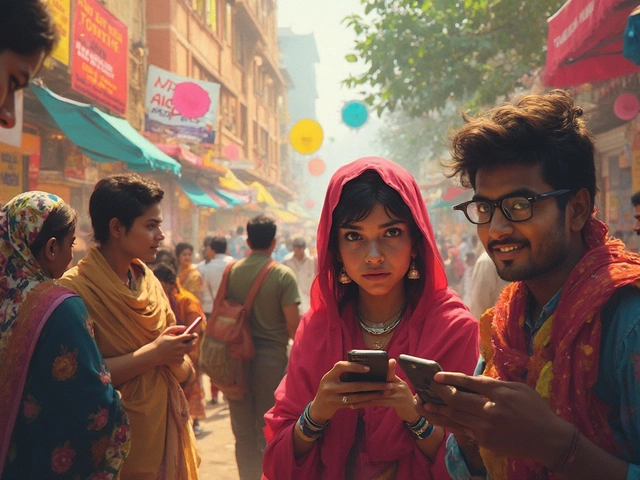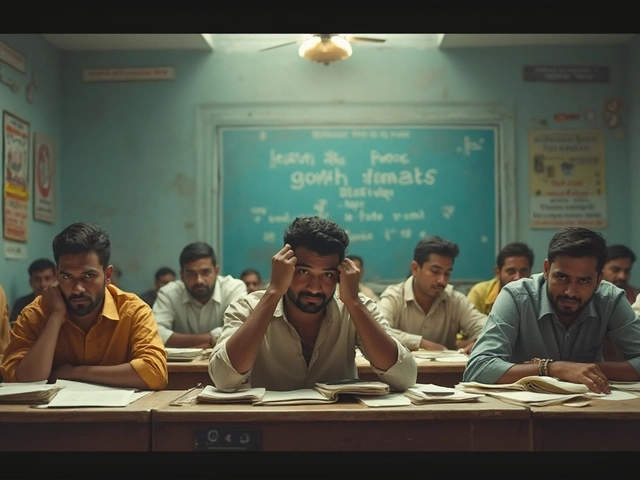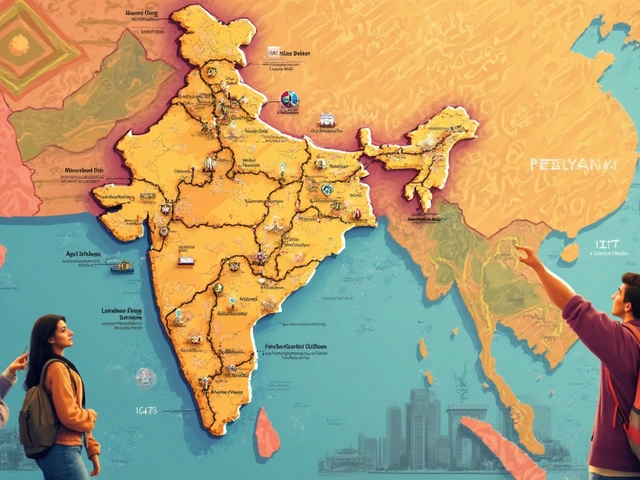
You’d think every doctor grinds hard, right? Sure. But step into a NEET coaching center on exam week and ask about the toughest doctor to become—one answer always pops up: neurosurgeon. But why? Is it the years spent just studying nerves, or something more?
When you look at the ‘hardest’ medical specialties, it’s not only about getting the textbook answers right. It’s about the path—grueling entrance exams, ruthless cut-off ranks, marathon years in med school, and then a lifetime of keeping calm while making life-or-death calls. Some people actually love that pressure! Knowing which branch asks for what kind of grind early on can save your future self a load of stress—and maybe a few all-nighters during your coaching days.
- What Makes a Doctor 'Hard' to Become?
- The Top Contenders: Specialties That Push the Limits
- Why Neurosurgery Tops the List
- Tips for NEET Aspirants: Surviving and Thriving
What Makes a Doctor 'Hard' to Become?
So, what turns a regular medical journey into the path to becoming the toughest doc in town? There are a few solid reasons you’ll notice—none of them just about scoring high marks.
- Selection Ratio: The top specialties have a tiny number of seats. For example, in NEET PG 2024, neurosurgery across India had under 200 seats but tens of thousands of applicants aimed for it.
- Training Years: Some fields, like neurosurgery, demand a decade or even more of training after MBBS. Not everyone is ready for that kind of commitment.
- Work-Life Balance: Tough specialties rule your schedule. A study of Indian doctors showed over 59% of neurosurgery residents worked more than 80 hours a week—way above the average.
- Demand for Precision: Mistakes in some specialties can have massive consequences. The mental load is no joke.
Let’s look at a side-by-side to see how things stack up:
| Specialty | Avg. Years Post-MBBS | Seats in NEET PG 2024 | Avg. Weekly Hours (India) |
|---|---|---|---|
| Neurosurgery | 7-10 | ~180 | 80+ |
| Cardiology | 8-9 | ~450 | 70 |
| Dermatology | 5-7 | ~650 | 50 |
| Pediatrics | 5-7 | ~1400 | 55 |
Basically, becoming the hardest doctor to become isn’t about just being book-smart. It’s about keeping your cool for years, handling heavy-duty work, and fighting for almost every opportunity. The bar isn’t set high—it’s set out of reach for most people.
The Top Contenders: Specialties That Push the Limits
Alright, there’s more than one contender for the title of “hardest doctor to become”, and it’s not just about who clocks the most late nights. These branches push even the best students up against the wall—and only a handful make it out the other side.
Let’s break down the ones that always crop up on the toughness charts. Here are the medical specialties that test brains, grit, and nerves:
- Neurosurgery – Every year, only a few hundred seats open for this super-specialty, and the cut-off ranks in NEET SS (Super Specialty) exams are brutal. The training period stretches over 10-12 years after you finish 12th grade if you include MBBS and all super-specialty training.
- Cardiothoracic Surgery – Think open-heart surgeries. You’re dealing with some of the sickest patients around, and the responsibility crushes most. Not many pick it, even fewer survive the residency years.
- Plastic and Reconstructive Surgery – Despite what movies show, this isn’t about cosmetics alone. Sure, some cases are, but imagine handling burn victims or serious trauma cases where every millimeter of stitching matters. Admission to M.Ch. programs is highly competitive.
- Pediatrics (Neonatology) – Tiny patients, tiny margins for error. One wrong move isn’t an option, because you’re dealing with newborns fighting for life. Seats for DM (Neonatology) are limited, and the mental load is heavy.
- Oncology – Cancer specialists not only need scientific sharpness but insane emotional stamina too. Patients are often at their worst—and treatments go on for years. Seats are tough to grab in leading government institutions.
Just how exclusive are these fields? Check out what the numbers looked like in recent years:
| Specialty | Years of Training (Post-12th) | Seats Available (India, 2024) | Median NEET SS Rank |
|---|---|---|---|
| Neurosurgery | 10-12 | ~350 | Under 200 |
| Cardiothoracic Surgery | 10-12 | ~220 | Under 250 |
| Plastic Surgery | 10-12 | ~280 | Under 300 |
| Neonatology | 11-12 | ~100 | Under 120 |
| Medical Oncology | 11-12 | ~150 | Under 140 |
To put it simply: these aren’t careers you just stumble into. It’s a mix of years of study, competitive exams at every stage, and day-to-day work that’s not for the faint-hearted. If you want to be the hardest doctor to become, you’ll need to be ready for the marathon and the obstacles.

Why Neurosurgery Tops the List
If you ask around, everyone in medical coaching talks about neurosurgery like it’s the boss level. And honestly, they're not wrong. Want to see why the journey to becoming a neurosurgeon is brutal? Here’s what you’re up against.
First up, the timeline. Most medical specialties require five to eight years after MBBS, but neurosurgery takes the cake. In India, you usually need to crack NEET PG, finish a three-year MS in General Surgery, and then clear an insanely tough super-specialty entrance. After that, you put in around six more years for a MCh in Neurosurgery (even longer in some colleges). So, after your 5.5 years in MBBS, you’re still staring at almost a decade before you’re fully qualified.
| Stage | Years (India) |
|---|---|
| MBBS | 5.5 |
| PG in General Surgery | 3 |
| Super-Specialty MCh | 5-6 |
| Total | 13.5-14.5 |
It’s not just the years, though. Neurosurgeons are always working on the most critical parts of the human body—brains and spines. The hours are insane. Residents pull 70-100 hour weeks, sometimes even more in big hospitals. A single surgery can run for 10-20 hours. One slip? That's the patient’s entire life changed, and no one forgets that.
Now, let’s talk numbers. Seats for neurosurgery are some of the most limited across all specialities in India. For example, in 2024, there were fewer than 250 MCh neurosurgery seats at government and top private colleges combined. And thousands apply every year after fighting through other competitive exams. Cracking that is a whole new level.
- Steepest learning curve—there’s no room for casual mistakes
- Relentless hours—work-life balance practically doesn’t exist at the start
- Pressure—it’s not just academic competition, it’s real patient lives on the line
- Constant upskilling—brain surgery tools and techniques change fast, so you’re always learning
No wonder every NEET coaching batch has that one person saying, “I want to be a neurosurgeon,” and the rest just raise their eyebrows. If you’re looking for the hardest doctor to become, this is the spot that tests if you’ve really got the grit. Not impossible, but definitely not for everyone—and that’s the whole point.
Tips for NEET Aspirants: Surviving and Thriving
Chasing a spot in the hardest doctor to become path means your NEET prep can't be average. Everyone’s aiming high, but the cutoff for top specialties like neurosurgery or cardiology is brutal. So here’s what really matters:
- Start Early, Stay Consistent: The top NEET rankers? Most begin prep two or three years ahead. They swear by daily revision rather than last-minute cramming. Look at previous years’ toppers and you’ll see a pattern: steady, small wins stack up.
- Quality Trumps Quantity: It’s not about burying yourself in a mountain of books. Focus on core NCERT, mock tests, and avoid jumping into every resource you find online. Finish what’s in the NEET syllabus first—then look at extras.
- Practice Under Pressure: Take practice tests with real timing. The pressure on the actual day is different from your room. Coaching veterans usually set a timer and do at least one full test every week in the last three months.
- Don’t Ignore Your Health: Burnout is real. The Medical Council of India says that up to 40% of med aspirants struggle with sleep or stress. Get some fresh air, sleep enough, and don’t skip meals—your brain needs fuel just as much as your notes do.
- Find a Crew: Study groups or even just a supportive friend can keep you sane. When you’re stuck, talking it out or even teaching someone else helps stuff really stick.
“Don’t measure your progress by how fast others go. Measure it by how far you’ve come since yesterday.” — Dr. Devi Shetty, renowned cardiac surgeon
Nobody says you need to be superhuman. Find what works, stick to it, and remember: getting to the hardest specialty isn’t about being born a genius. It’s about keeping your head in the game, no matter what. And hey, if you stick with it, you might just be the one in that white coat one day.





